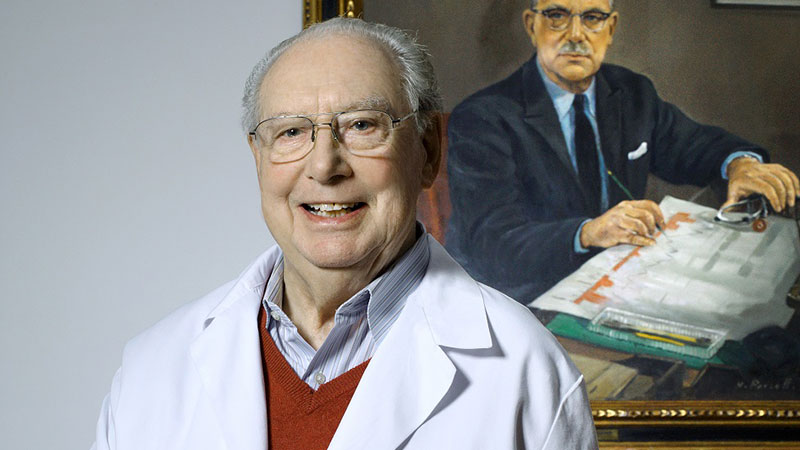Claude Migeon, Pediatric Endocrinologist at Johns Hopkins Medicine, Dies at 94
03/06/2018

Claude Migeon, M.D., the director of pediatric endocrinology at the Johns Hopkins University School of Medicine from 1961 to 1994 and the scientist whose early focus on steroid metabolism established the norms of adrenal function in infancy and childhood, died on March 4. He was 94.
Born in Lievin, France, Migeon received his baccalaureate degree from Lycée de Reims and his medical degree from the University of Paris. He completed his pediatric training at the Hôpital des Enfants-Malades in Paris and postdoctoral training in biochemistry at the University of Paris. In 1950, he received a Fulbright Scholarship to pursue postgraduate training at Johns Hopkins under Lawson Wilkins, who had founded the first pediatric endocrine clinic in the world at Johns Hopkins in 1935.
Wilkins had just demonstrated for the first time that cortisone reversed many of the biochemical abnormalities in patients with congenital adrenal hyperplasia, a group of genetic conditions that affect the adrenal glands. Migeon spent two years as a fellow under Wilkins, then undertook an intensive, three-year research study with Leo T. Samuels, director of the Department of Biochemistry at the University of Utah School of Medicine in Salt Lake City. After Migeon completed his fellowship with Samuels, studying cortisol secretion and metabolism in humans, he was persuaded by Wilkins to return to Johns Hopkins to take charge of his laboratory.
After Wilkins’ retirement in 1960, Migeon and another former Wilkins fellow, Robert Blizzard, were appointed co-directors of the pediatric endocrinology division at Johns Hopkins. Migeon then served as sole director of that division after 1974, when Blizzard left to take a departmental chairmanship at the University of Virginia. Migeon was succeeded by interim directors Leslie Plotnick and Samuel Casella in 1994, and Michael Levine assumed division director duties in 1999. In 2016, Migeon officially retired, moving from full professor to professor emeritus.
Much of today’s knowledge of the quantitative aspects of steroid secretion and metabolism in childhood is the result of the meticulous studies carried out by Migeon and his students. They performed seminal research in disorders of sexual development, with key contributions related to congenital adrenal hyperplasia and androgen insensitivity. These studies ranged from the biochemistry and cellular biology to the molecular genetics of these disorders. Migeon’s studies also contributed greatly to the understanding of the long-term outcomes of patients with disorders of sexual development. The high degree of scholarship in Migeon’s nearly 300 publications is so well-documented that between 1965 and 1978 he was one of the world’s 1,000 most cited contemporary scientists.
“Claude Migeon’s contributions to the subspecialty of pediatric endocrinology are best illustrated by the remarkable number of fellows he trained who populated leadership positions in endocrinology internationally,” says George Dover, M.D., former director of the Johns Hopkins Hospital Department of Pediatrics. “He was also a remarkable clinician whose patients included multiple generations in the same families. Within the Department of Pediatrics at Hopkins, he was an outstanding advocate and role model for the pediatric physician scientist.”
Migeon devoted considerable time to mentoring the many research fellows who flocked to Baltimore to receive their first research training under his guidance. These fellows are now dispersed throughout the world and remember with gratitude his selflessness in giving up evenings to review their manuscripts and provide them with guidance in new research approaches.
On rare occasions, Migeon could be persuaded to share his epic adventures as a young student working with the French resistance during World War II. His elopement with former Harriet Lane pediatric resident Barbara Ruben was attended by Lawson Wilkins, whose generosity toward fellows was continued by Migeon and his wife throughout their careers. Barbara Migeon, M.D., is a professor of pediatrics at the Johns Hopkins University School of Medicine and an active teacher, researcher and globally known publisher in the field of genetics.
In 1991, Claude Migeon was awarded The Robert H. Williams Distinguished Service Award, which honors a member of the Endocrine Society who has served the field of endocrinology and nurtured generations of endocrinological scholars. In 1972, Migeon, along with Robert Blizzard, formed the Lawson Wilkins Pediatric Endocrinology Society, with Migeon serving as its founding president. He received the society’s Judson J. Van Wyk Award in 2009, as well as the International Award of the European Society of Pediatric Endocrinology in 2015. Until his death, Migeon was a board member of American Memorial Hospital in Reims, the city where he began his medical training.
In 2014, Migeon published a biography on the life of Wilkins — Remembering Doctor Lawson Wilkins: A Pioneer of Pediatric Endocrinology — which he co-authored with Wilkins’ daughter, Elizabeth Wilkins McMaster. And in spite of moving to the emeritus role in 2016, he remained active in the Johns Hopkins Division of Pediatric Endocrinology until very recently. At the time of his death, Migeon was working on a book about his own life and the development of pediatric endocrinology at Johns Hopkins since Wilkins’ death.
In addition to his wife of almost 58 years, he is survived by three children: Jacques Claude, Jean-Paul and Nicole; and four grandchildren: Sophie, Jonathan, Sebastien and Colette.
